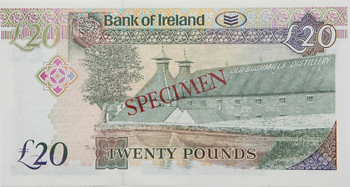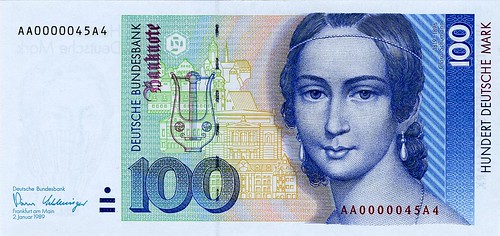
PREV ARTICLE
NEXT ARTICLE
FULL ISSUE
PREV FULL ISSUE
READER TAKES ON BANKNOTE DESIGN
Inspired by our recent discussions of banknote designs, some readers share thoughts on the design process and the placement of women on
currency. -Editor
Women on U.S. Banknotes
We already had a woman on U.S. paper money - one of my favorite notes and that would be Martha Washington - then Liberty on the Fractional notes. Something We Can All Agree On

Bushmills Distillery on the Bank of Ireland 20 pound note David Powell writes: I have just returned on Saturday from my first-ever holiday in Northern Ireland. The argument over whether to put men or women on banknotes is very simple; any person considered, of either sex, would invariably be either Protestant or Catholic, which would offend at least some of the people in the other community big time. The Bank of Ireland seems to have resolved this by deciding that, since the only thing which Protestants and Catholics appear to have in common is their love of alcohol, a picture of one of their best known distilleries {Bushmills} is the safest choice for use on all their most commonly used denominations. For more information on the banknotes, see:
Criteria for Deciding Who to Honor on Banknotes
John Kleeberg submitted these thoughts on criteria for deciding who should and shouldn't be honored, and why. Thanks. -Editor

The most successful group of non-sexist banknotes, in my opinion, was the "Personality Series" issued by the Deutsche Bundesbank in 1990-2001. It consisted of 8 notes, ranging from 5 Deutschemark to 1000 Deutschemark, with 4 notes with female personalities and 4 notes with male personalities, although boys still beat girls by one because the Brothers Grimm both appeared on the 1000 DM note (so the notes depicted five men and four women). Not only did the series have gender balance, it also was balanced by religion, with three Roman Catholics, three Lutherans, one Jew (Paul Ehrlich) and two Reformed (Calvinist) (the Brothers Grimm). Because of Germany's tumultuous history, politicians and military leaders were out of the question - Bismarck and Erich Ludendorff certainly had great ability, but they would be unacceptable on a modern German banknote - and so individuals were chosen from art, literature, music, business, science and technology. In the end no businessperson, and no one from technology, ended up being chosen. It was also decided not to include any super personalities - so no Goethe, no Schiller, and no Duerer. (This may have also been because East Germany already had a Goethe note.) The series also tried to have as many different occupations as possible, although it ended up with two poets (Arnim and Droste-Huelshoff). The choices were excellent: Bettina von Arnim, Carl Friedrich Gauss, Annette von Droste-Huelshoff, Balthasar Neumann, Clara Schumann, Paul Ehrlich, Maria Sibylla Merian and the Brothers Grimm. The notes tell a history that ranges from baroque architecture (Neumann) to the cure of syphilis (Ehrlich) to a pioneer of entomology (Merian). The DM 10 note, with Gauss, depicts both triangulation and a bell curve. The notes presented German culture and civilization in the best light possible. The only problem is that they circulated for too short a time, a little over a decade, after which the boring Euro notes replaced them. The United States would do well to follow this approach. Eliminating politicians and military figures is a good start - they carry a lot of negative baggage. I like the idea of leaving out the super figures - so Mark Twain, Walt Whitman, Elvis Presley, Humphrey Bogart, Marilyn Monroe, Ernest Hemingway and Frank Sinatra are hors concours. I decided on eight notes (adding a $200 note); the male female split would be 4 and 4; there would be two African-American notes, and one apiece representing Asian Americans, Latino Americans, and Native Americans. Just as in the German notes, male and female notes alternate as the denominations progress, and there is diversity among occupations. I violate my ban on politicians once to let in Wilma Mankiller. So here's my proposal: $1 Cesar Chavez; $2 Wilma Mankiller; $5 Scott Joplin; $10 Mary Cassatt; $20 Frank Lloyd Wright; $50 Marian Anderson; $100 An Wang; $200 Emily Dickinson. As an alternative, a series of notes of American painters (with a depiction of the painter on the front, and an example of the painter's work on the reverse) would result in very attractive multicolor notes. It would advertise the United States of America not for its military might, nor for its economic wealth, but for its contribution to culture. For this series I propose: $1 John Singleton Copley; $2 Mary Cassatt; $5 Thomas Cole; $10 Georgia O'Keeffe; $20 Winslow Homer; $50 Helen Frankenthaler; $100 Jackson Pollock; $200 Lee Krasner. I think a Jackson Pollock note would be a knockout.
Dislodging the Dead Presidents is a tall order, but proposing banknote designs always makes for an interesting discussion. No matter who
is proposed, they'll have baggage in someone's mind. Allegorical figures of Liberty, Industry, Enlightenment etc. embody positive
values without political baggage. But a series honoring American painters sounds like a great idea, and less fraught with politics.
I've always been a Mary Cassatt fan. All of this seems like a fairly moot point though, given the incredibly high costs of designing
and producing hard-to-counterfeit notes. Maybe there's room in the virtual money world for more colorful and varied currency designs.
-Editor
For more information on the notes, see this Wikipedia article (in German), see:
To read the earlier E-Sylum article, see:
Wayne Homren, Editor The Numismatic Bibliomania Society is a non-profit organization promoting numismatic literature. See our web site at coinbooks.org. To submit items for publication in The E-Sylum, write to the Editor at this address: whomren@gmail.com To subscribe go to: https://my.binhost.com/lists/listinfo/esylum All Rights Reserved. NBS Home Page Contact the NBS webmaster 
|